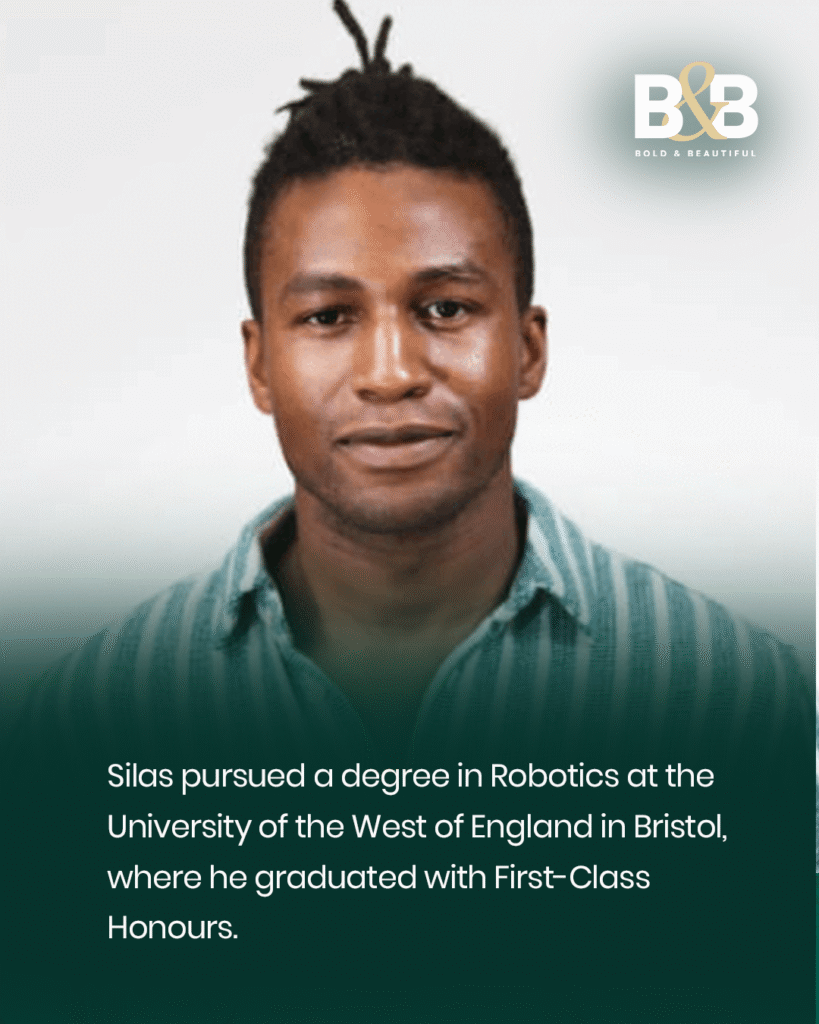Long before his name appeared in the tech pages of Forbes, Wired, and The Guardian, Silas Adekunle was a quiet teenager in the UK, captivated by the elegance of machines and the invisible rules that govern them. Born in Nigeria and raised in the bustling streets of Lagos before relocating to the UK in his teens, Silas grew up between two worlds – one rooted in heritage and discipline, the other humming with opportunity and invention.

His fascination with robotics did not begin in a fully equipped lab or with formal coding lessons. It started with a sense of curiosity about how things moved, how systems interacted, and how imagination could become function. While other children were immersed in traditional play, Silas found joy in disassembling gadgets and figuring out their inner logic. That spark would eventually become the foundation of a career that redefined the global conversation around gaming, robotics, and representation.
Silas pursued a degree in Robotics at the University of the West of England in Bristol, where he graduated with First-Class Honours. At university, he encountered what many bright students from underrepresented backgrounds experience – a lack of role models who looked like him in the fields he aspired to thrive in. But instead of letting that absence define his journey, he saw it as a challenge to become the very figure he had once needed.
In 2013, Silas co-founded Reach Robotics, a UK-based startup aimed at fusing robotics with gaming and education. His vision was crystal clear: to build robots that didn’t just respond to commands but created immersive, intelligent play experiences. That vision materialised in MekaMon, a four-legged robot with personality, emotion, and learning potential. It wasn’t just a toy; it was a new frontier.
MekaMon allowed users to engage with robotics through augmented reality, offering a glimpse into the future of play and education. It had sensors, lifelike movement, and could learn through interaction. MekaMon was both entertainment and education, something that bridged the growing digital gap in a generation raised on screens but underserved by educational tech.

Silas caught the eye of global tech players, and in 2017, he made history when Apple partnered with Reach Robotics. MekaMon became the first consumer robot sold in Apple stores across the UK and US. The deal was a game-changer, placing Silas and his company on the world stage. It was not just a commercial win, but a symbolic one. A young Black engineer from Nigeria was breaking barriers in an industry where such representation remained painfully rare.
Despite the remarkable innovation and attention, Reach Robotics closed its doors in 2019, citing the immense challenges of scaling consumer robotics in a competitive market. The closure could have been the end of the story, but for Silas, it was simply a transition. He had never been in it for the spotlight. He was in it to solve problems, to make technology human, and to show young Africans and minorities worldwide that they too belonged in labs, boardrooms, and tech summits.
Since then, Silas has redirected his energy towards education-focused tech projects and supporting innovation ecosystems across Africa. He has worked closely with initiatives that empower African youth through science and technology, believing firmly that the next global disruptors are waiting in classrooms from Nairobi to Lagos. His story has become a rallying cry for equitable access to STEM education.
What sets Silas apart is not just his intelligence or entrepreneurial drive, but his insistence on authenticity. He does not posture as a guru or tech celebrity. He speaks thoughtfully about failure, leadership, and the weight of responsibility that comes with being one of the first. In interviews, he reminds us that innovation is not just about code and hardware – it is about the problems you choose to solve, and the people you choose to empower.

In a tech industry often accused of valuing novelty over necessity, Silas Adekunle’s approach is refreshingly grounded. He builds not just for profit, but for purpose. He is committed to developing technology that educates, inspires, and leaves the door wide open for others to walk through. He remains one of the brightest examples of how genius can emerge from unexpected places and reshape entire industries.
Silas Adekunle is still writing his story. But already, he has done something extraordinary. He has made young people from Lagos to London believe that intelligence is not confined by geography, and that innovation can have an African accent.





